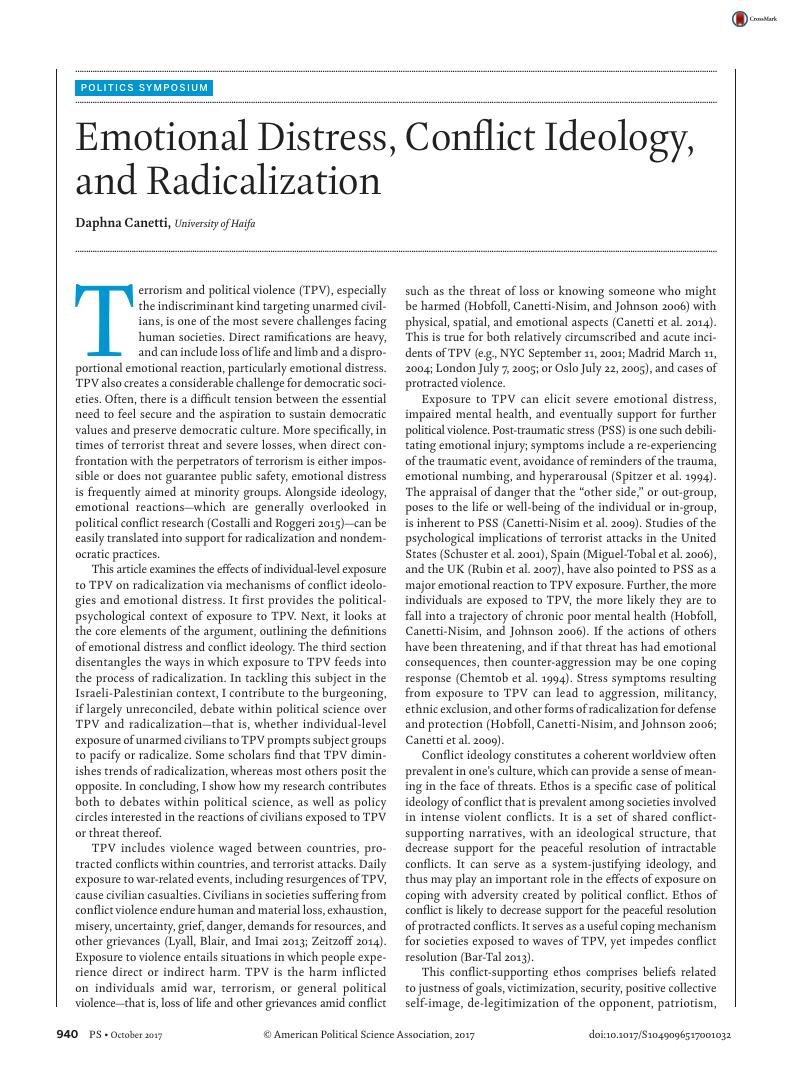Crossref Citations
This article has been cited by the following publications. This list is generated based on data provided by Crossref.
Fair, C. Christine
and
Chen, Junjie
2017.
Polity or Policy? Explaining Ordinary Muslimss Support for Suicide Bombing.
SSRN Electronic Journal ,
Todd, Jennifer
2018.
Identity Change after Conflict.
p.
147.
Fair, C. Christine
and
Savla, Samta
2018.
A Replication Study: Understanding Muslims’ Support for Suicide Bombing in West Africa.
SSRN Electronic Journal ,
Ljamai, Abdelilah
2020.
Feelings of anxiety among radical Muslim youths in the Netherlands: A psychological exploration.
Archive for the Psychology of Religion,
Vol. 42,
Issue. 3,
p.
335.
Muluk, Hamdi
Umam, Ahmad Naufalul
and
Milla, Mirra Noor
2020.
Insights from a deradicalization program in Indonesian prisons: The potential benefits of psychological intervention prior to ideological discussion.
Asian Journal of Social Psychology,
Vol. 23,
Issue. 1,
p.
42.
Fachter, Shani
Schiavo, Gianluca
Snider, Keren LG.
Cappelletti, Alessandro
Stock, Oliviero
Weiss, Patrice L.
Zancanaro, Massimo
and
Canetti, Daphna
2021.
“Come and share a story with me”: Promoting engagement between Ethiopian and Non-Ethiopian Israelis via joint digital narratives.
Technology in Society,
Vol. 67,
Issue. ,
p.
101723.
Levin-Banchik, Luba
2021.
Precrisis military hostility and escalation in international crises.
Conflict Management and Peace Science,
Vol. 38,
Issue. 1,
p.
63.
Saguy, Tamar
and
Reifen-Tagar, Michal
2022.
The social psychological roots of violent intergroup conflict.
Nature Reviews Psychology,
Vol. 1,
Issue. 10,
p.
577.
Reifen‐Tagar, Michal
and
Cimpian, Andrei
2022.
Political Ideology in Early Childhood: Making the Case for Studying Young Children in Political Psychology.
Political Psychology,
Vol. 43,
Issue. S1,
p.
77.
Reinke de Buitrago, Sybille
2022.
Radikalisierungsnarrative online.
p.
1.
Hertz, Uri
Snider, Keren L. G.
Levy, Adi
Canetti, Daphna
and
Gross, Michael L.
2022.
To shoot or not to shoot: experiments on moral injury in the context of West Bank checkpoints and COVID-19 restrictions enforcement.
European Journal of Psychotraumatology,
Vol. 13,
Issue. 1,
Mégret, Frédéric
2023.
Transitional justice for the “war on terror?”.
Journal of Human Rights,
Vol. 22,
Issue. 5,
p.
643.
Reinke de Buitrago, Sybille
2024.
Keeping Peace in Troubled Times.
p.
27.
Laterzo, Isabel G.
2024.
Progressive Ideology and Support for Punitive Crime Policy: Evidence from Argentina and Brazil.
Comparative Political Studies,
Vol. 57,
Issue. 6,
p.
999.
Zeitzoff, Thomas
and
Gold, Grace
2024.
Cyber and contentious politics: Evidence from the US radical environmental movement.
Journal of Peace Research,
Vol. 61,
Issue. 1,
p.
134.
Penić, Sandra
Donnay, Karsten
Bhavnani, Ravi
Elcheroth, Guy
and
Albzour, Mai
2024.
How does the geography of surveillance affect collective action?.
Political Psychology,
Vol. 45,
Issue. 2,
p.
319.
Barak, Adi
Safyon, Mor
and
Ben-Ezra, Liron
2025.
Ideological meaning-making in the aftermath of traumatic loss: Radicalization as meaning.
Death Studies,
Vol. 49,
Issue. 1,
p.
77.



